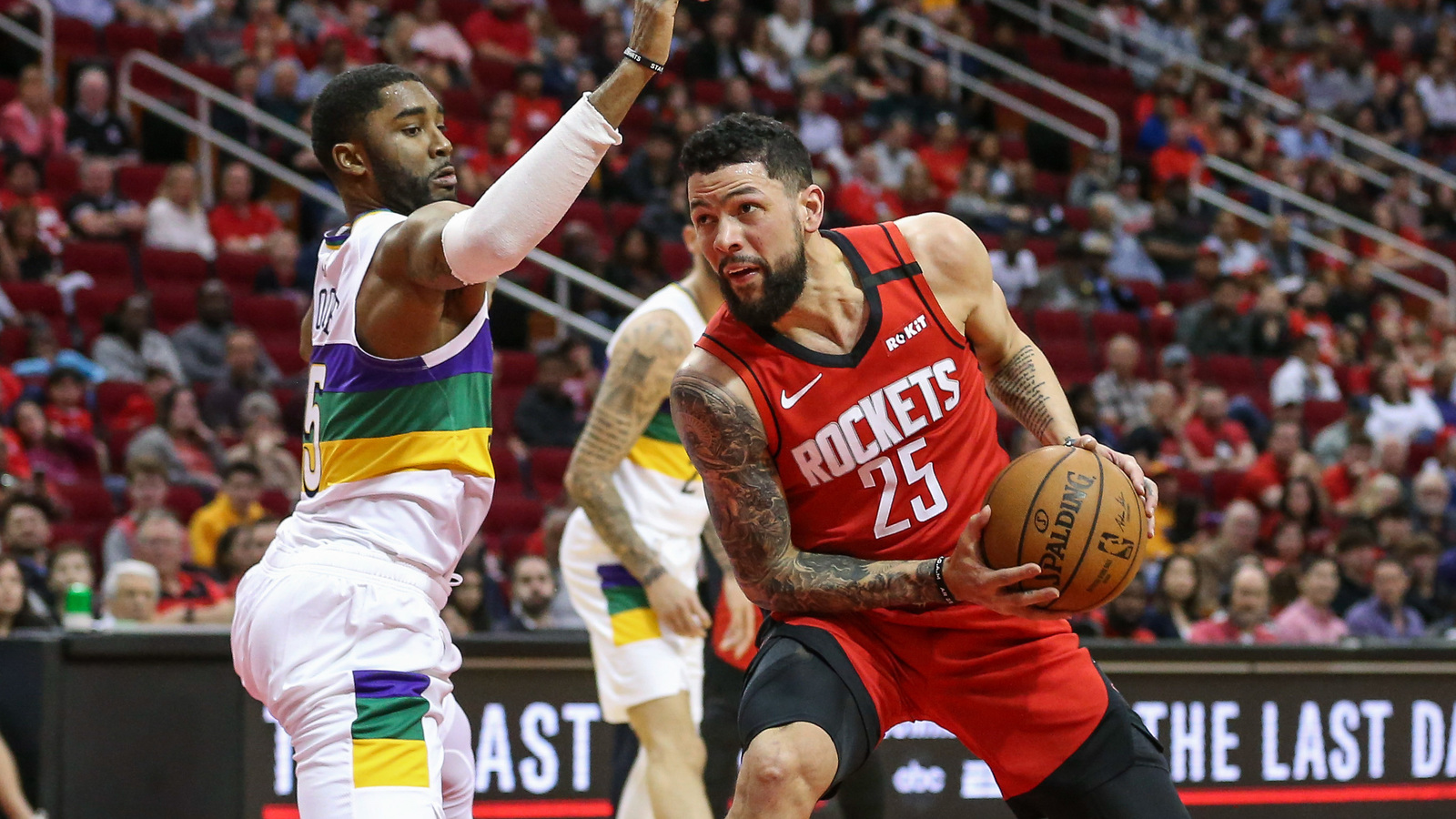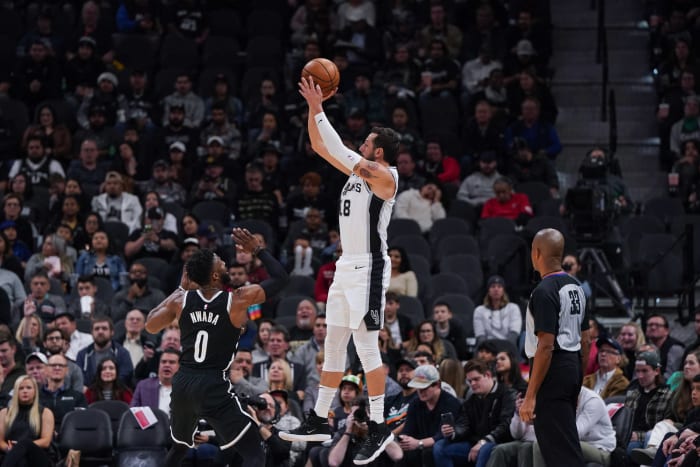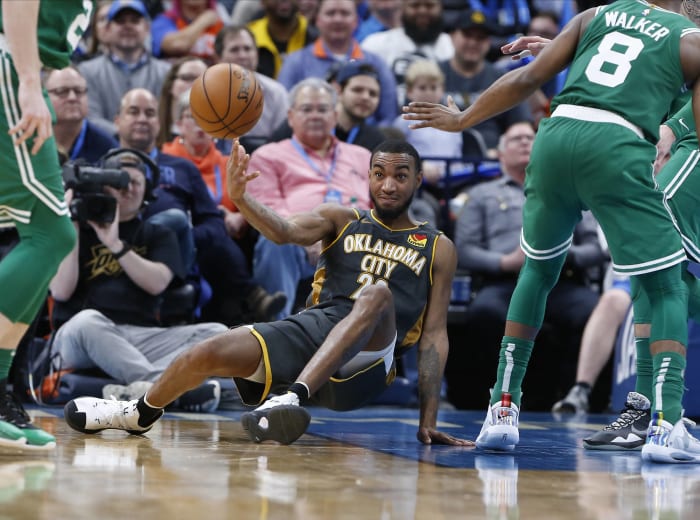
Western fizzlin': Four players who must up their games after break
The All-Star break is upon us. For teams across the league, that means a week of rest and a chance to re-align for the stretch run. At least four Western Conference players, however, should be on edge. They all must improve in the second half.
Gary Harris, Denver Nuggets
At 38-17, only four games behind the Lakers, the Nuggets entered the All-Star break in sole possession of second in the Western Conference. Despite its lofty perch, this is no time for Denver to relax in a rough-and-tumble conference. Only 3.5 games separate the Nuggets from the fifth-place Rockets. For Denver to make a run at the NBA Finals and lock up home-court advantage in the first round, it needs Harris, a well-compensated shooting guard, to snap out of his funk.
After three straight seasons from 2015-2018 in which he looked like one of the NBA’s rising stars, Harris production has dropped significantly. In 2018-19, his field goal percentage (48.5 to 42.4), three-point percentage (39.6 to 33.9) and scoring average (17.5 points per game to 12.9) declined from the previous season. The 25-year-old guard has taken another step back this season.
Entering the All-Star break, Harris is shooting only 40 percent from the field and 29.9 percent from three and averaging 10.2 points. Thankfully for Denver, the sub-par output from Harris -- who will make nearly $18 million this season -- hasn’t significantly hurt the team’s overall performance ... yet. The Nuggets are actually still slightly better (+4.1 points per 48 minutes) when Harris plays than when he sits (+3.3 per 48), which is thanks largely to his presence defensively.
Marginal gains on the defensive end of the floor aren’t what the Nuggets need from their starting shooting guard, however. The offensive output must tick up considerably if Denver is going to be a threat in the playoffs. It’s hard to tell if this extended funk by Harris is a run-of-the-mill slump caused by bad luck (and a nagging thigh injury) or a deeply worrisome trend. One normally could look at past shooting numbers and compare them to present percentages to see where issues lie. But Harris has a complicated past.
For starters, his 2014-15 rookie campaign was one of the most dreadful in recent memory. In the past 40 years, only two rookies have played more than 700 minutes and shot below 31 percent from the field and 21 percent from three -- Harris and Jim Les, a guard with the Utah Jazz in 1988-89. Couple that with the fact that Harris has recently put together 103 games (from the start of 2018 season to now) of middling play, and it’s difficult to determine where the baseline is. Is it the Harris we saw emerge from his sophomore season to 2018? Or the floundering rookie who has produced like a below-average vet the past year and a half?
With so much at stake after the All-Star break, the Nuggets hope Harris returns to the form of two seasons ago. If not, Denver could be headed for disappointment.

Austin Rivers, Houston Rockets
Give the veteran guard credit for consistency. For his career, Rivers has shot 41.7 percent from the field and 34.6 from deep. This season, Rivers is shooting 41.2 percent from the field and 33.7 from three. Even his scoring numbers -- 9.1 points for his career to 8.5 for this season -- are nearly the same.
Yet given his situation with the Rockets, the fact that Rivers is essentially the same player he’s always been is a problem. Houston employs Russell Westbrook and James Harden -- players who are masterful at drawing the full focus of defenses. According to NBA.com’s tracking data, Westbrook and Harden combine to create a whopping 38.2 points off their assists per game. Their gravitational pull sets up myriad open shots for other Rockets, a key reason why Rivers’ teammate, Ben McLemore, has resurrected his flagging career in Houston.
Like McLemore, Rivers sees his fair share of clean looks playing alongside Harden and Westbrook. Over half -- 52.4 percent to be exact --- of the shots Rivers takes from deep have a defender at least four feet away (the shortest distance to be classified as “open” per NBA.com). It’s hard to imagine that a player could have such a bevy of undisturbed shots given the size, speed and length of NBA defenders. Yet Rivers (and McLemore) are living on easy street.
And therein lies the problem. With Eric Gordon’s injury woes this season, the Rockets need their bench to step up. McLemore has reached new heights, averaging 10.2 points -- 6.3 points more than last season. Rivers must up his production, too.

Marco Belinelli, San Antonio Spurs
A San Antonio bench featuring Belinelli, Davis Bertans and Patty Mills buried opponents last season under an avalanche of threes. It’s the reason why two of the three lineups that featured the team’s core starters in 2018-19 could be outscored by opponents on a team that still finished 14 games over .500.
This season's Spurs entered the All-Star break 23-21 in large part because the bench mob in which Belinelli was featured last season is a distant memory. Bertans was shipped to Washington in an ill-fated attempt to lure Marcus Morris during free agency. Mills is still playing well, but Belinelli is a shell of his former self.
Entering the All-Star break, the Italian guard was shooting a dismal 37.1 percent from the field and an underwhelming 34.6 percent from three. Because of his limited production, Belinelli has seen his minutes slashed and scoring average nearly halved -- dropping from 10.5 points per game in 2018-19 to just 5.4.
Like the Nuggets' Harris, there may be a mitigating factor for San Antonio’s veteran guard, who's 33 years old. According to the findings in 2011 study by economists David Berri and Rob Simmons, NBA players begin their peak years around 26 and decline at about 30. While the improvement of training techniques and load management has helped players extend their peaks, not all are immune. There is a chance that we could very well be witnessing Belinelli’s last gasp as a rotation-caliber NBA player.
There’s also a possibility that the veteran has just struggled through an extended slump. After all, Belinelli is hitting on just 30.5 percent of his three-point shots NBA tracking data considers to be "wide open" (or lacking a defender within six feet). That’s a stark drop from the 38.5 conversion rate he had during the 2018-19 season.
Bottom line: If the Spurs are to keep their 22-season playoff streak alive, they need more production from Belinelli.

Terrance Ferguson, Oklahoma City Thunder
This wasn’t supposed to be a season that mattered for the Thunder (33-22), who are surprisingly sixth in the West. The Russell Westbrook trade was meant to signal the full-fledged rebuild for the franchise. During this period, the performance of Ferguson, a 21-year-old wing, should be a footnote on the way to the next era. Instead, thanks to a revived Chris Paul and the young, explosive backcourt around him, OKC is right in the thick of things. And that’s shone a harsh light on Ferguson, who has taken a significant step back this season.
In 2018-19, Ferguson finished with marks of 42.9 percent from the field and 36.3 percent from three. The third-year forward has dipped to 38.7 percent overall and a ghastly 31.3 percent from beyond the arc this season.
The problem for the Thunder is that there are not a bevy of rotations options to replace, or at least cut into, Ferguson’s 25 minutes per game. That’s meant when he’s been healthy, Ferguson -- who averages 4.5 points -- has continued to see steady action.
More must-reads:
- 10 teams, 10 questions: Issues NBA contenders face in title drive
- Could Bucks, Lakers regret their quiet trade deadline?
- The 'Most points in a playoff game by team' quiz
Breaking News
Customize Your Newsletter
 +
+
Get the latest news and rumors, customized to your favorite sports and teams. Emailed daily. Always free!

